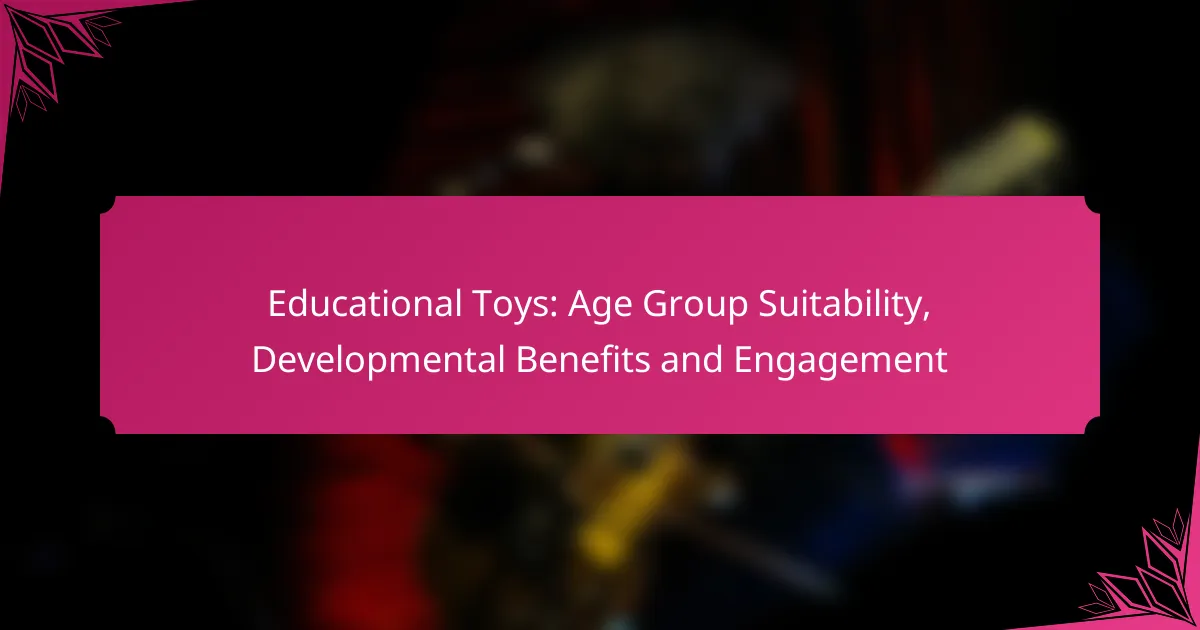Choosing the right educational toys for children is essential for their growth and development at various stages. For infants, toys that encourage sensory exploration and motor skills are ideal, while toddlers benefit from options that enhance physical, cognitive, and social abilities. Preschoolers thrive with toys that foster problem-solving, creativity, and social interaction, making age-appropriate selections crucial for effective learning through play.
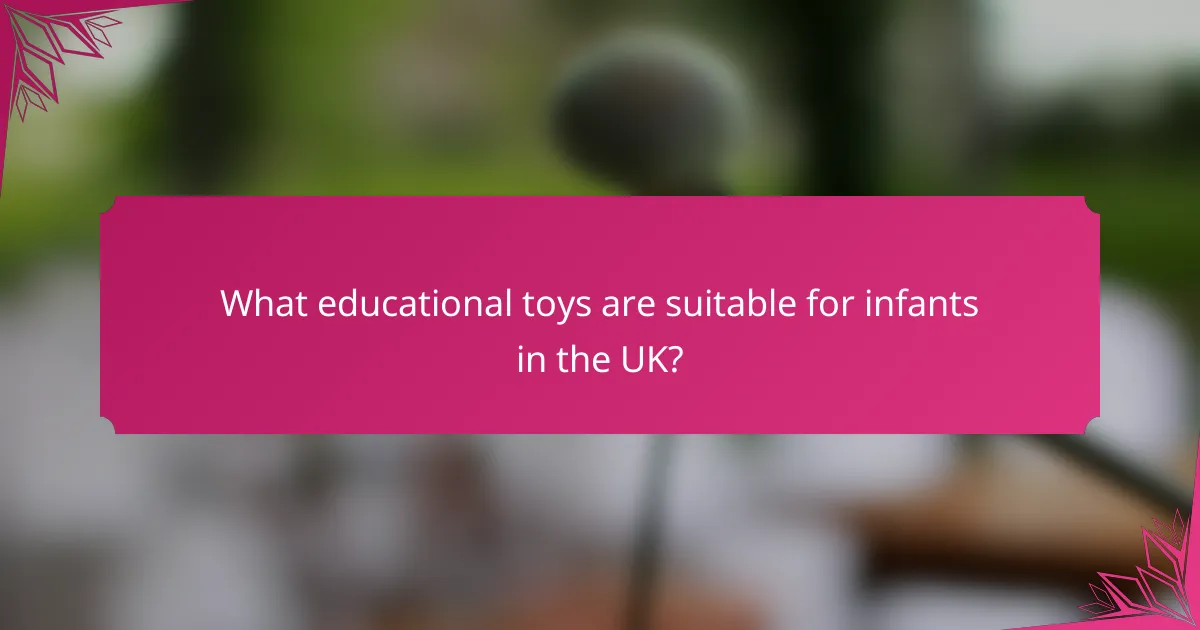
What educational toys are suitable for infants in the UK?
In the UK, suitable educational toys for infants typically include items that promote sensory exploration and basic motor skills. These toys should be safe, durable, and designed to engage infants in a way that supports their developmental milestones.
Soft blocks for sensory development
Soft blocks are excellent for sensory development in infants, as they encourage tactile exploration and hand-eye coordination. Made from safe, non-toxic materials, these blocks are lightweight and easy for little hands to grasp and manipulate.
When selecting soft blocks, look for those with varied textures, colors, and patterns to stimulate visual and tactile senses. Blocks that make sounds or have different shapes can further enhance engagement and learning opportunities.
Musical toys for auditory stimulation
Musical toys provide auditory stimulation that can aid in language development and cognitive skills. Instruments like soft maracas, xylophones, or toys that play lullabies can captivate an infant’s attention and encourage them to explore sound.
Choose musical toys that are easy to operate and safe for infants. Look for options that offer a variety of sounds and melodies to keep the infant engaged. Avoid toys with small parts that could pose a choking hazard, ensuring they meet UK safety standards for infant toys.
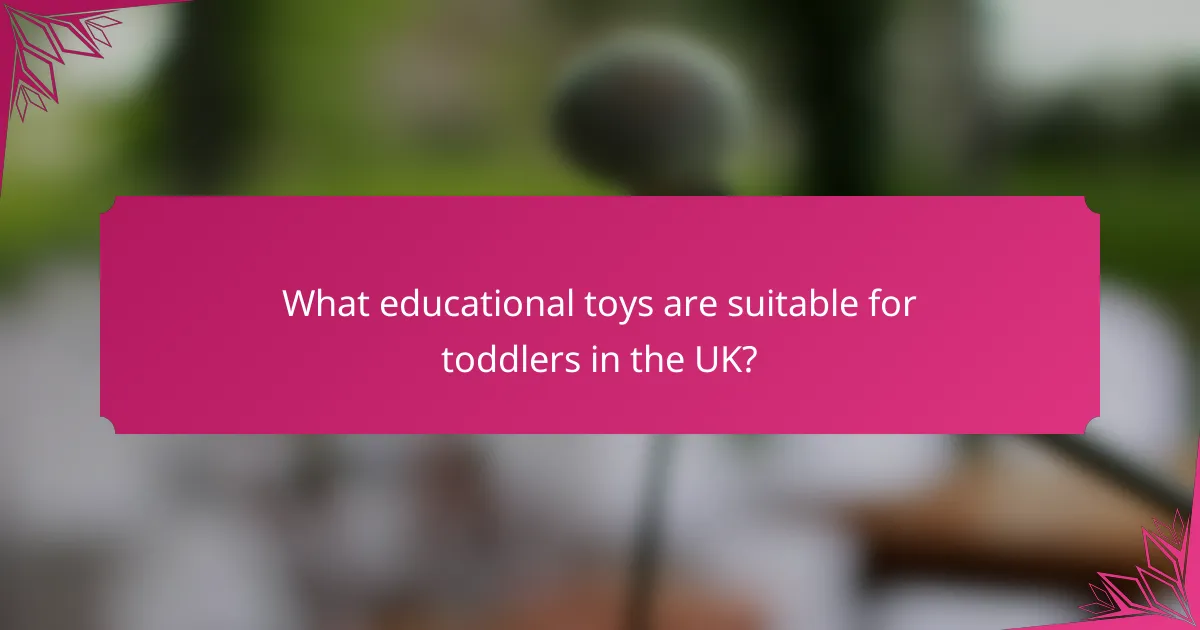
What educational toys are suitable for toddlers in the UK?
In the UK, educational toys for toddlers typically include items that promote physical, cognitive, and social development. Suitable options often feature engaging designs and materials that encourage exploration and learning through play.
Building sets for fine motor skills
Building sets are excellent for developing fine motor skills in toddlers. These toys often consist of large, easy-to-handle pieces that allow young children to stack, connect, and create various structures.
When selecting building sets, look for options made from safe, non-toxic materials that comply with UK toy safety regulations. Popular choices include wooden blocks and plastic interlocking bricks, which can help improve hand-eye coordination and dexterity.
Interactive books for language development
Interactive books are a fantastic tool for fostering language development in toddlers. These books often feature textures, flaps, and sounds that engage children and encourage them to explore language through storytelling.
Choose books that are age-appropriate and include simple vocabulary and engaging illustrations. Reading together can enhance comprehension skills and promote a love for reading, which is crucial for early literacy development.
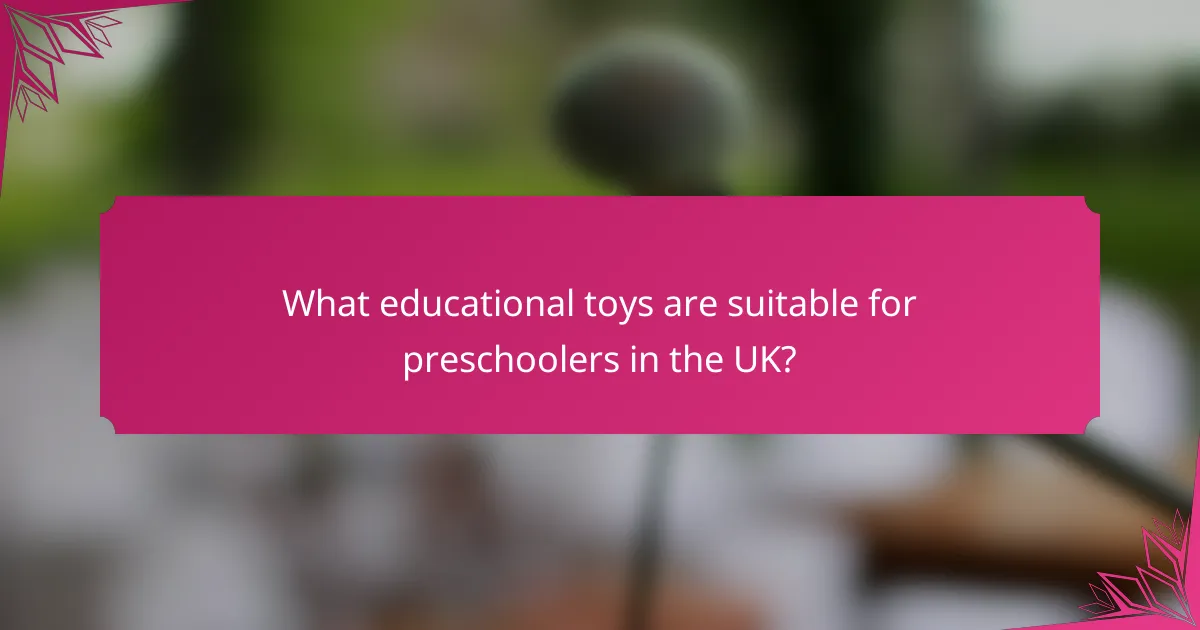
What educational toys are suitable for preschoolers in the UK?
Educational toys for preschoolers in the UK should promote learning through play, focusing on skills like problem-solving, creativity, and social interaction. Look for toys that are age-appropriate, safe, and designed to engage young minds.
Puzzles for problem-solving skills
Puzzles are excellent tools for developing problem-solving skills in preschoolers. They encourage children to think critically as they figure out how pieces fit together, enhancing their cognitive abilities.
When choosing puzzles, consider options with varying difficulty levels to match your child’s skills. Wooden puzzles with large, colorful pieces are often a good choice for younger preschoolers, while more complex jigsaw puzzles can challenge older ones.
Ensure that the puzzles are made from non-toxic materials and comply with UK safety standards, such as EN71, to guarantee they are safe for children to use.
Art supplies for creativity and expression
Art supplies like crayons, markers, and clay foster creativity and self-expression in preschoolers. These tools allow children to explore their imagination and develop fine motor skills as they create their art.
Opt for non-toxic, washable art supplies that are suitable for young children. Sets that include a variety of colors and textures can keep preschoolers engaged and encourage them to experiment with different artistic techniques.
Consider setting up a dedicated art space at home where children can freely express themselves without the worry of making a mess. Regularly rotating the art supplies can also maintain their interest and inspire new creations.
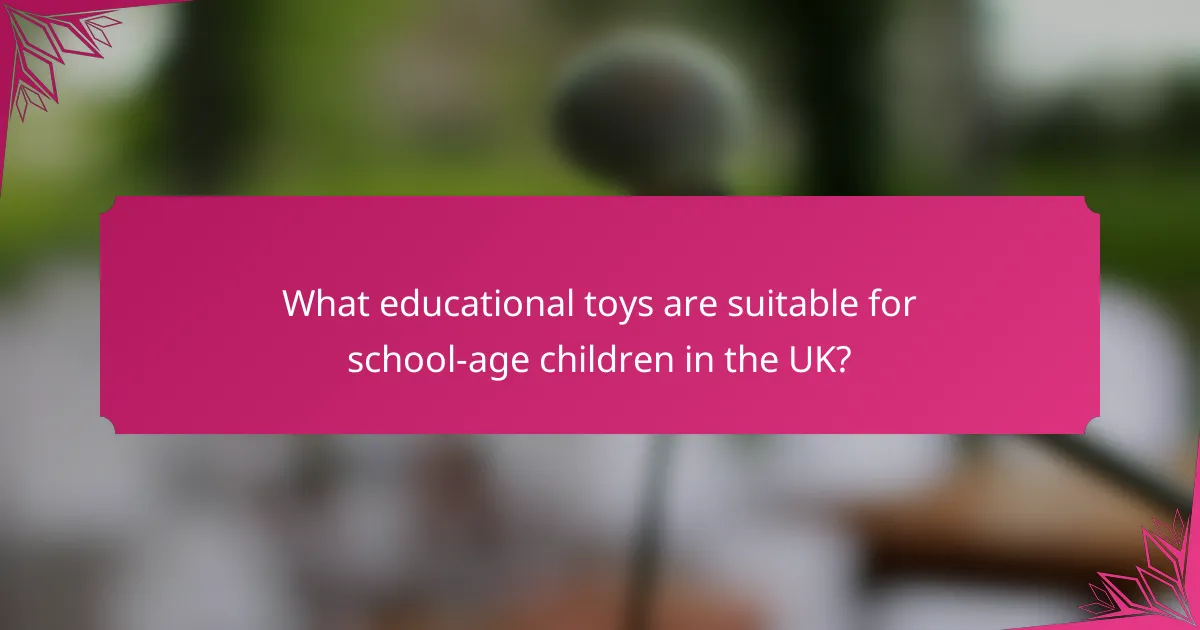
What educational toys are suitable for school-age children in the UK?
Educational toys for school-age children in the UK should promote learning while being engaging and fun. Options like STEM kits and board games are excellent choices as they encourage critical thinking and social skills development.
STEM kits for critical thinking
STEM kits are designed to foster critical thinking by engaging children in science, technology, engineering, and mathematics activities. These kits often include hands-on experiments, building projects, and problem-solving tasks that challenge children to think logically and creatively.
When selecting a STEM kit, consider the child’s age and interests. Kits that cater to various skill levels are available, ranging from simple robotics for younger children to complex coding projects for older kids. Popular options include building sets, chemistry sets, and coding games.
Board games for social skills
Board games are an effective way to develop social skills in school-age children. They encourage teamwork, communication, and strategic thinking, making them ideal for group play. Games that require players to negotiate, share, or collaborate can significantly enhance interpersonal skills.
Look for board games that are age-appropriate and promote interaction. Classic games like Monopoly or newer options like Catan can be great choices. Aim for games that can accommodate multiple players to maximize social engagement and learning opportunities.
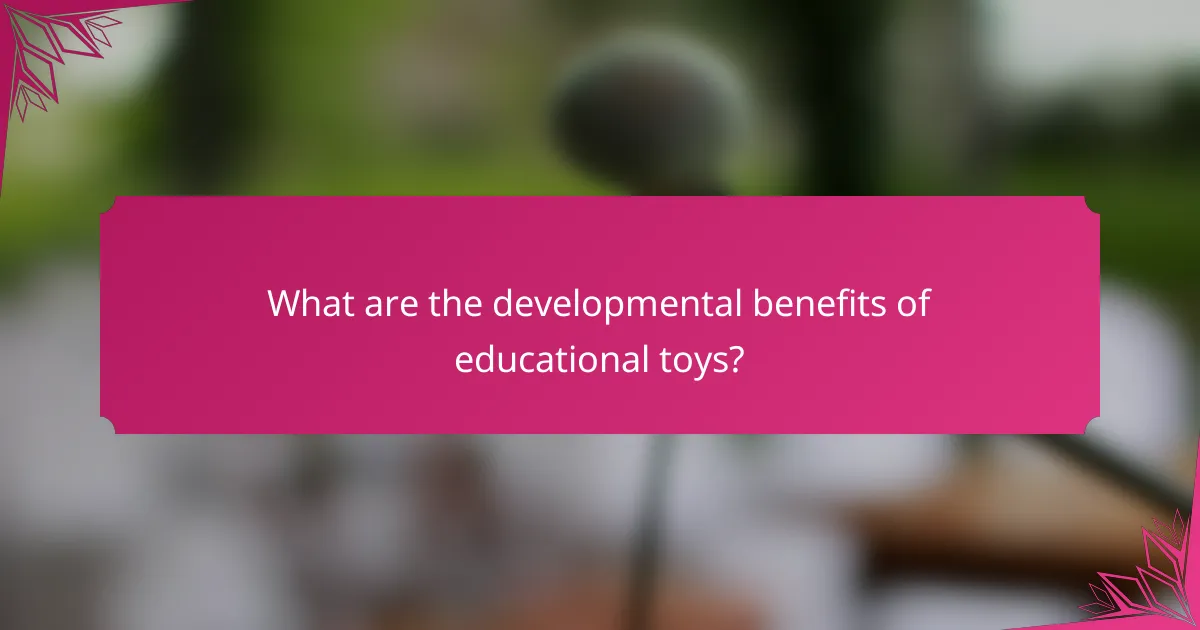
What are the developmental benefits of educational toys?
Educational toys provide significant developmental benefits by enhancing various skills in children. They stimulate cognitive growth, promote social interaction, and encourage creativity, making them essential tools for early learning.
Enhancement of cognitive skills
Educational toys enhance cognitive skills by engaging children in problem-solving and critical thinking activities. Toys like puzzles, building blocks, and memory games challenge young minds, helping them develop reasoning and spatial awareness.
When selecting toys, consider options that match the child’s age and developmental stage. For instance, toddlers may benefit from simple shape sorters, while older children can tackle more complex construction sets. Aim for toys that encourage exploration and experimentation.
Promotion of social interaction
Educational toys promote social interaction by encouraging cooperative play among children. Toys designed for group activities, such as board games or team-building exercises, help children learn to communicate, share, and resolve conflicts.
To maximize social benefits, choose toys that require teamwork or collaboration. For example, group art projects or interactive games can foster friendships and teach valuable social skills. Avoid overly competitive toys that may lead to frustration or isolation among peers.
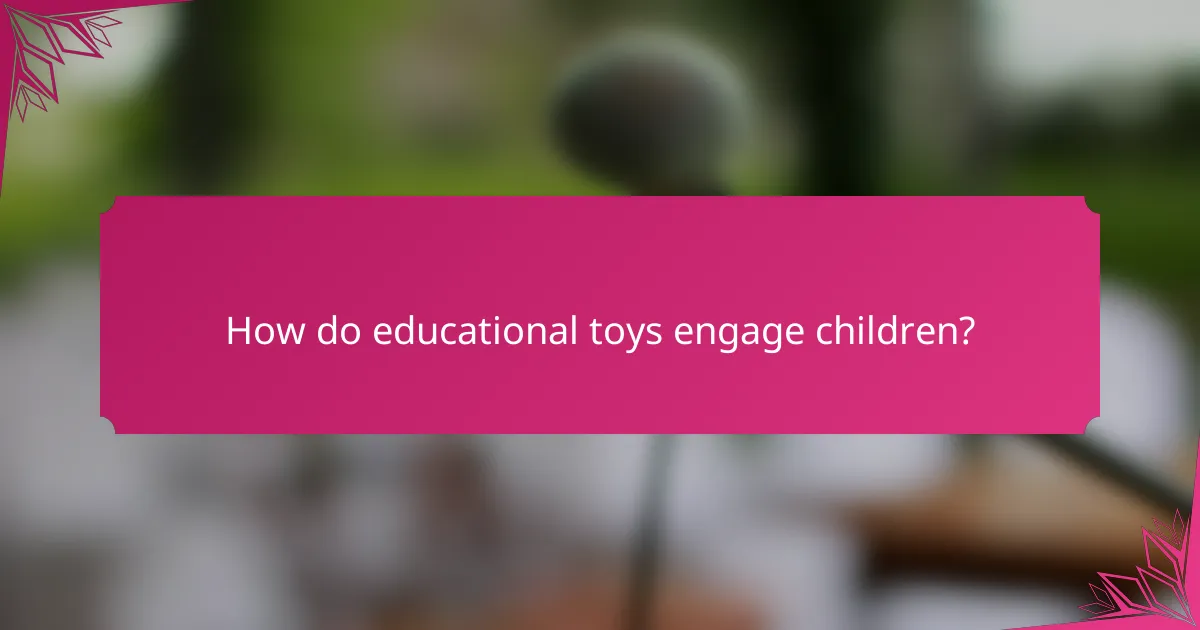
How do educational toys engage children?
Educational toys engage children by promoting active learning through hands-on experiences and stimulating curiosity. These toys encourage exploration and problem-solving, which are essential for cognitive and social development.
Interactive features for active participation
Interactive features in educational toys, such as buttons, sensors, and touch screens, invite children to engage directly with the toy. This participation enhances their learning experience by allowing them to see immediate results from their actions, fostering a sense of achievement.
For example, toys that respond to touch with sounds or lights can keep children entertained while teaching cause-and-effect relationships. Look for toys that require manipulation or input, as these can significantly boost engagement and retention of new concepts.
Variety of themes to maintain interest
A diverse range of themes in educational toys helps maintain children’s interest over time. Themes can include animals, space, vehicles, or everyday life scenarios, which cater to different interests and developmental stages.
Choosing toys that align with a child’s current interests can enhance their motivation to play and learn. For instance, a child fascinated by dinosaurs may benefit from a toy that combines storytelling with interactive learning about prehistoric life.
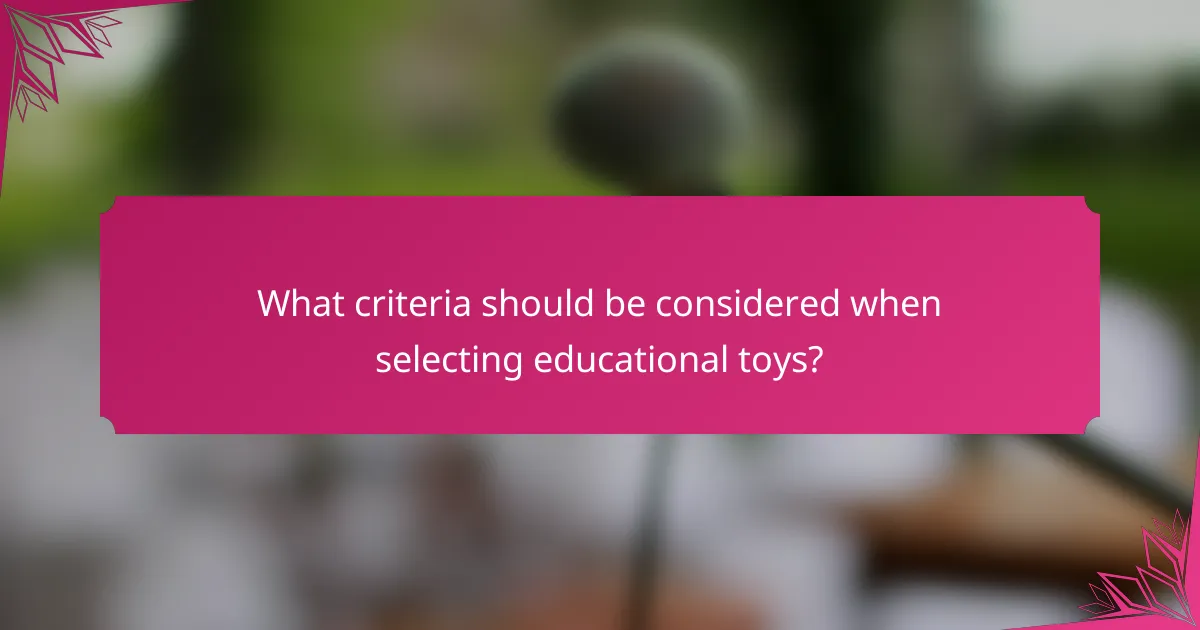
What criteria should be considered when selecting educational toys?
When selecting educational toys, consider factors such as age appropriateness, material quality, and developmental benefits. These criteria ensure that the toys are safe, durable, and effective in promoting learning and engagement.
Age appropriateness for safety
Age appropriateness is crucial for safety when choosing educational toys. Toys should match the developmental stage of the child to prevent choking hazards or injuries. For instance, toys designed for toddlers often have larger pieces, while those for older children may include smaller parts.
Check labels for recommended age ranges, which are typically based on safety standards. For example, toys labeled for ages 3 and up are generally safe for children who can understand not to put small items in their mouths.
Material quality for durability
Material quality plays a significant role in the durability of educational toys. High-quality materials, such as solid wood or non-toxic plastics, can withstand rough play and last longer. Look for certifications indicating that the materials are safe and free from harmful chemicals.
Consider the toy’s intended use; for example, outdoor toys should be made from weather-resistant materials. Checking customer reviews can also provide insights into how well a toy holds up over time, helping you make a more informed choice.
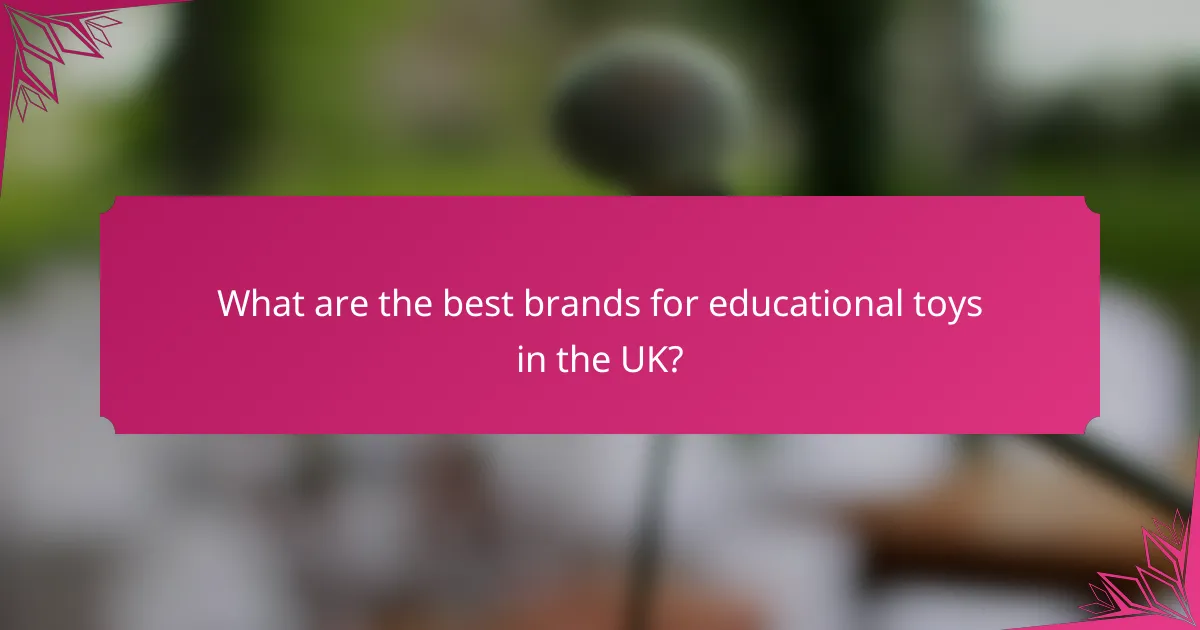
What are the best brands for educational toys in the UK?
Some of the best brands for educational toys in the UK include LEGO, Fisher-Price, and Melissa & Doug. These brands are known for their high-quality, engaging toys that promote learning and development across various age groups.
LEGO
LEGO offers a wide range of building sets that encourage creativity and problem-solving skills. Their products cater to different age groups, from simple Duplo sets for toddlers to complex Technic models for older children. The versatility of LEGO allows for endless possibilities in play and learning.
Fisher-Price
Fisher-Price specializes in toys designed for infants and toddlers, focusing on sensory development and motor skills. Their products often include interactive features that engage young children, making learning fun. Look for toys that promote exploration and imaginative play to maximize developmental benefits.
Melissa & Doug
Melissa & Doug is known for its wooden toys that emphasize open-ended play and creativity. Their educational toys often include puzzles, role-play sets, and art supplies, which help develop fine motor skills and cognitive abilities. Choose toys that align with your child’s interests to enhance engagement and learning.
